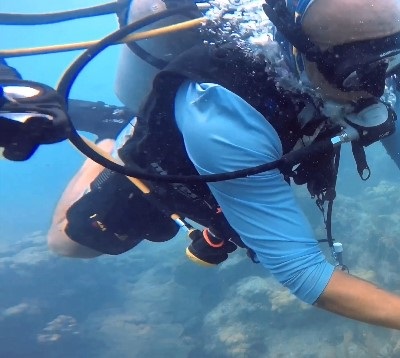 Key West:--- Experts from around the Caribbean region are meeting at the Eco-Discovery Centre in Key West to share information on an emerging and unprecedented threat to Caribbean coral reefs posed by a coral disease first documented in Florida and now being reported at sites across the region.
Key West:--- Experts from around the Caribbean region are meeting at the Eco-Discovery Centre in Key West to share information on an emerging and unprecedented threat to Caribbean coral reefs posed by a coral disease first documented in Florida and now being reported at sites across the region.
Since 2014, the Florida Reef Tract has been severely impacted by a newly documented coral disease which scientists are calling “Stony Coral Tissue Loss Disease” because it affects only hard stony corals and is characterized by the rapid loss of live coral tissue. The disease has rapidly spread across coral reefs from Palm Beach to the lower Florida Keys and in the last year has been reported elsewhere in the Caribbean, including in Mexico, Jamaica, Sint Maarten, the Dominican Republic, the U.S. Virgin Islands, the Turks and Caicos Islands and Belize.
“Stony Coral Tissue Loss Disease affects some of the slowest-growing and longest-lived reef-building corals, including the iconic brain corals, star corals and pillar corals,” explained Dr. Andy Bruckner, Research Coordinator at Florida Keys National Marine Sanctuary, where the meeting is taking place.
“Scientists from NOAA and the state of Florida, sanctuary managers and academic partners have been working to document the outbreak, identify causes and contributing factors, and develop treatments and interventions,” he added.
As the disease has begun to be reported in other parts of the Caribbean, experts from Florida are sharing their valuable knowledge with counterparts around the region to help them identify the disease and learn how to respond once it has been documented. The learning exchange includes 22 participants from 17 countries and territories of the Caribbean.
“The visitors will see first-hand how this disease has impacted Florida’s coral reefs. With local experts, they’ll learn about monitoring for and treating the disease and about local efforts to save this incredibly important ecosystem,” explained Dana Wusinich-Mendez from the NOAA Coral Reef Conservation Program.
“The visitors are not only learning from Florida’s experience but are also sharing with their hosts and with each other. The gathering is an important opportunity to exchange information and experiences about the disease progression and status of response efforts in other affected countries.”
Tadzio Bervoets, director from the Sint Maarten Nature Foundation attended the meeting and commented: “Given the significance of coral reef ecosystems to our islands, it’s imperative that we join forces with scientists, communities and the authorities to find possible solutions to this issue. By exchanging ideas and sharing expertise with other countries we hope to keep pace with advances in managing the disease. We are learning from our Florida hosts that once the disease has been reported it is essential to respond rapidly to prevent it from spreading to a wider area. What we learn at this meeting is giving us a head start to face this disease.”
Superintendent of Florida Keys National Marine Sanctuary, Sarah Fangman, welcomed the visitors and commented: “Everyone here is aware of the vital role corals play in our region. In the Florida Keys, coral reefs help to support some 33,600 jobs and bring over $2.1 billion to the local economy. While the situation is urgent, it is not too late to save this incredibly important ecosystem. Corals are resilient if given the chance and the enabling conditions for their growth and survival.”
The meeting is an initiative of the MPAConnect Network which comprises marine protected area managers in 10 Caribbean countries and territories, working in partnership with the Gulf and Caribbean Fisheries Institute and the US National Oceanic and Atmospheric Administration’s Coral Reef Conservation Program, with funding from NOAA CRCP and the NFWF Coral Reef Conservation Fund.
For more information please contact Emma Doyle at This email address is being protected from spambots. You need JavaScript enabled to view it..












